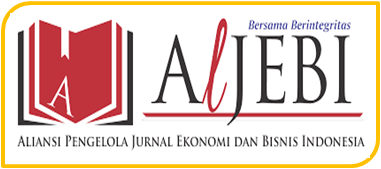Sustainability of Islamic Economics in The Political Domain in Mojokerto
Abstract
Economy and politics influence each other. A changing political map will affect policy to economic conditions and vice versa. Likewise with Islamic economics, its development was influenced by political power during the emergence of Islamic economics until today. Islamic political economy has a positive value for Indonesia in an effort to accelerate the empowerment of small and medium enterprises as an element of economic growth. One of the areas for Islamic economic instruments to become part of national policy is regulation. Through research with qualitative methods and a literature study approach, the researcher wants to analyze the regulations on the Islamic economy in Mojokerto district which has many micro, small and medium enterprises. Researchers conducted this research with the aim of analyzing the sustainability of Islamic economic values to all components of government apparatus and business actors in Mojokerto Regency and at the same time offering regulations to the Mojokerto Regency government which focuses on efforts to increase the size of the Islamic economic industry in institutional expansion. This study provides the results, first, Islamic economic values have not been sustainable in the political economy of Mojokerto Regency. Second, the sustainability of the Islamic economy in Mojokerto Regency can be realized in the political economy of government through policies or regulations that improve the Islamic financial industry by synergizing it with the community to empower MSMEs.
Keywords
Full Text:
PDFReferences
Azra, Azyumardi. 2004. Network of Middle East and Archipelago Archipelago Ulema in XVII & XVIII Century. Bandung: Mizan.
Devi, Novia Candra. 2019. The Influence of Motivation of the People of Mojokerto Regency in Paying Zakat Infaq Shadaqah (Study at LAZISMU Mojokerto Regency. Scientific Journal, 8 (1).
Hadi, Sutrisno. 2015. Methodology Research. Yogyakarta: Andi.
Hooker, M.B. 2008. Indonesian Syari'at: Defining a National School of Islamic Law. Singapore: Institute of Southeast Asia Studies.
Iswanto, Bambang. 2013. Islamic Economics and Political Law in Indonesia. Mazahib, XII (2).
JDIH (Legal Documentation and Information Network). 2020. http://jdih.mojokertokota.go.id/.
Kholis, Nur. 2013. The Influence of Politics in the Development of Islamic Economic Practices in Indonesia. Millah, XII (1).
Miles and Huberman. 2012. Qualitative Data Analysis, Resource Book About New Methods. Jakarta: UI Press.
OPD (Regional Apparatus Organization). 2020. Interview. 8 November 2020.
Siandi. 2020. Interview. 18 October 2020.
SIP Mojokerto. 2019. MSME players in Mojokerto in 2018, at https://www.mojokertokota.go.id/home/pemerintah/instansi_detail/is2017011707511815.
Strauss, Anselm, and Corbin, Juliet. 2013. Basics of Qualitative Research. Yogyakarta: Student Library.
Sudiarti, Sri. 2016. Islamic Political Economy Strategy. Human Falah, 3 (1).
DOI: https://doi.org/10.18860/miec.v1i1.12541
Refbacks
- There are currently no refbacks.

This work is licensed under a Creative Commons Attribution-ShareAlike 4.0 International License.
Editorial Office:
Megawati Soekarnoputri Building
Faculty of Economics
Jln. Gajayana 50 Telp (0341) 558881
E-mail: m-iecjournal@uin-malang.ac.id
UIN Maulana Malik Ibrahim Malang
Member of:
Indexed by:
Maliki Islamic Economics Journal under a CC BY SA 4.0 International License.
View My Stats


























